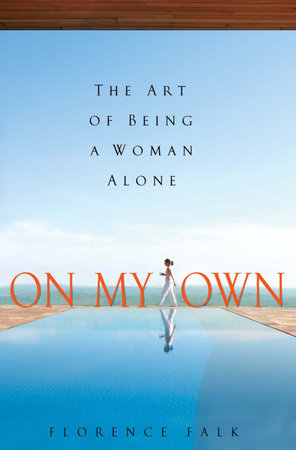On My Own Reader’s Guide
By Florence Falk


1. The book opens with this short quotation from Anne Morrow Lindbergh’s Gift from the Sea: “Woman must come of age by herself. This is the essence of ‘coming of age’—to learn how to stand alone.” How does this quote express the book’s intended purpose? Was this the author’s personal experience? How does it correspond to your own? Would you agree that aloneness is an interior state as well as an external condition?
2. The author suggests that the book’s subject matter concerns all women, inasmuch as all women inevitably find themselves alone, not once but many times during our lives. Does this strike you as true? If so, can you point to any moment in your own life where, by default, choice, or necessity you found yourself alone? Did you feel prepared for the experience? If so, how? If not, what held you back?
3. Do you think the book’s subject matter is as important for married women as singles? Why or why not?
4. Chapter 1 begins with Lisa’s story and this question: “If I am a woman alone, who am I?” How does it resonate for you? How do you feel about Lisa’s distress after her breakup with Sam? Do you think the experience was a turning point in her life? What did it teach her?
5. “We often mistake aloneness and loneliness for each other, but they are not the same.” How do they differ? Discuss the author’s point that the issue for women is not that we will never feel lonely—considering that some degree of loneliness exists in all our lives—but how aloneness makes us feel about ourselves.
6. Do you agree that we need to “befriend” aloneness? If so, what difference do you think accepting aloneness would make in your life?
7. “For each of us in different ways, aloneness is the portal we enter to find our way into solitude and to the harvesting of the self.” What does this statement mean to you? Do you agree that stable relationships with others—partners, parents, children, or friends—are based on the solid foundation of a secure self? How does harnessing solitude help us to establish this goal?
8. “Women in our culture breathe in shame like oxygen and don’t even know it.” Consider whether this statement applies to you. If so, in what ways? Do you agree that despite having more social opportunities and independence than ever before, we still feel guilty nurturing ourselves? How might you begin to change this?
9. How do cultural messages women receive aggravate our sense of shame, fear, and inadequacy? Do you think these messages play into our fears about being women alone? How do our negative feelings keep us from forging a strong sense of self? Do you think the media has had a debilitating effect on women’s self-esteem? If so, how can we stay more alert to negative messages in future?
10. Discuss some of the differences between the cultural messages women and men receive. How does the spinster vs. bachelor dichotomy help clarify some of the differences?
11. Discuss a moment in your childhood or adolescence when “you first knew you’re you” and no one else. Consider how your childhood and/or adolescent experiences made you aware that you had to protect your “private self.” Do you remember feeling inside or outside a “magic circle”? What was that like for you? How might being a woman alone bring up some of the same kind of feelings?
12. Consider the secret garden as metaphor for a place of solitude in which to begin growing our private self. Do you remember your own secret garden? As an adult, do you feel you’ve lost touch with the solitude it provided? Discuss ways to retrieve it for yourself.
13. What does the author mean by the “art” of being a woman alone? Can you think of ways in which harnessing solitude might help you to find your own path to selfhood. Why does the author use the terms “active” or “creative” solitude? How would practicing active solitude help you?
14. The process of transitioning into aloneness begins with acceptance. Discuss some of the obstacles a woman faces that can interferewith that process. What does it mean to “start where you are”? How would faith and patience help you “revision” your story? What would “stepping out” mean for you?
15. The last chapter explores the relationship between aloneness and relationship. It suggests that rather than seek “rescue” by another person, we learn to accept aloneness. How can harnessing solitude to hear our own “voice” enhance our relationships with friends, partners, family, and the community at large—or, as the author says, from being alone to all one?
16. Describe some of the benefits that await a woman—with or without a partner—who has learned how to be on her own. Do you think the stories in the book help clarify the value of being on one’s own? If so, which ones were helpful to you? How might you help other women alone achieve some of the same benefits?
Just for joining you’ll get personalized recommendations on your dashboard daily and features only for members.
Find Out More Join Now Sign In